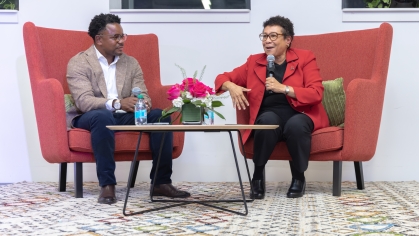Minority Biomedical Research Support Program Celebrates 32 Years Promoting Diversity
Graduate School-Newark Dean Kyle Farmbry presents MBRS Director Barry Komisaruk with a recognition plate for his years of service, commitment, and dedication to the program and the university.
Approximately 100 alumni, students, and faculty gathered for the Minority Biomedical Research Support (MBRS) Program anniversary dinner on Wednesday, April 14, to celebrate 32 years of promoting diversity in the sciences. Created in 1984, Rutgers University–Newark’s (RU-N) MBRS program has encouraged and supported minority students in their pursuit of degrees in the behavioral and biomedical sciences through funding, research opportunities, and mentorship.
The dinner was both a time for celebration and reflection as guests chatted about their research, career goals, the importance of MBRS, and specifically, the impact of Dr. Barry Komisaruk, the founder and director of the program at RU-N.
Komisaruk said that the program developed in response to attitudes and stereotypes suggesting that minority students were both uninterested and less capable than their peers. He saw these attitudes as a challenge and positioned MBRS as a “bastion against the all-too-prevalent public suspicion and hostility that stems from the ignorance of science.”
Although a 32nd anniversary is nontraditional, it coincides with the renewed funding from the National Institutes of Health (NIH), which makes this anniversary a joyous one. Starting July 1, 2016, RU-N’s MBRS program will receive a $3 million grant for five more years, totaling $14 million in funding since its creation.
“It’s so inspiring seeing so many people who have been successful through this program,” said Carolina Herrera, a doctoral candidate in psychology. Herrera will begin the MBRS program in the fall, and looks forward to joining a close-knit scientific community as she pursues her degree.
Since 1984, the program has supported 154 students. Of the 127 students that MBRS Program Coordinator Wendy Birbano was able to track, 69 percent have earned the doctorate, 39 percent have earned the PhD or MD/PhD, and 30 percent have earned the MD. The program supports undergraduate and doctoral students in the fields of biology, chemistry, environmental science, neuroscience, nursing, physics, psychology, and social work.
Dr. Shiva Singh, chief of the undergraduate and pre-doctoral training branch of the National Institute of General Medical Sciences of the NIH, shared his personal struggles during his praise of MBRS.
Singh recounted that as a child in India, he walked miles – sometimes wading through monsoon-flooded roads – just to go to school. In his later years, additional obstacles came in the form of prejudice and ever-present financial hardship. Despite these challenges, Singh achieved an upward trajectory that has allowed him – through the NIH – to give back to students who have the talent, but need the opportunities.
“If there is someone who is trying to pull you down, there’s another human being who is there to help you,” Singh said. “None of us gets to where we are without help from somebody.”
For many in the room, Barry was that somebody, and the event took a sentimental turn when an unsuspecting Komisaruk received a special tribute from the people whose lives he has touched. In a surprise video, alumni expressed their gratitude toward him as a mentor and friend.
“Mentorship is so important, and this is the individual who takes you under his or her wing and comforts you when you have those frustrating moments…that was my case with Barry,” said Byron Johnson, PhD, professor of biology at Essex County College, MBRS ’91.
Kyle Farmbry, dean of the Graduate School-Newark, presented Komisaruk with a special award recognizing his commitment and dedication to MBRS, and his more than 50 years of service in the Faculty of Arts and Sciences at RU-N.
“I was surprised to receive such a warm, formal recognition from the Rutgers-Newark community of students, faculty, staff and central administration for our program,” said Komisaruk. “[MBRS] is a program specifically designed to educate, encourage, and support students to enter careers in behavioral and biomedical research, and it is the students and their faculty mentors who make our program the success it has become.”
Photo by Karen Sanderson


